
Related
Guests
- Ann Garrisonindependent journalist who has closely followed Rwandan politics.
In the central African nation of Rwanda, voting is underway in the second presidential election since the genocide of 1994. Incumbent president Paul Kagame is widely expected to win, but the election comes amid a wave of attacks on political opponents. Human rights groups have accused the Kagame government of cracking down on any dissent before the vote, while the government-appointed media council has clamped down on independent newspapers publishing critical views. [includes rush transcript]
Transcript
AMY GOODMAN: We turn now to the central African nation of Rwanda, where voting is underway in the second presidential election since the genocide of 1994. The incumbent president, Paul Kagame, is widely expected to win, but the election comes amidst a wave of attacks on political opponents. Human rights groups have accused the Kagame government of cracking down on any dissent before the vote, while the government-appointed media council has clamped down on independent newspapers publishing critical views.
At a recent news conference, President Kagame dismissed the accusations and promised free and fair elections.
PRESIDENT PAUL KAGAME: Forget about this cheap talk about all sorts of things, you know, hell coming down from Rwanda and — no, forget about it. It’s not true, and it’s not going to happen, and it’s not happening. I can say that with confidence, and the elections are going to happen freely and fair.
AMY GOODMAN: Well, opposition leader Victoire Ingabire had hoped to contest the election as presidential candidate for her party, the United Democratic Forces. But in April, a court sentenced her to indefinite house arrest, effectively taking her out of the election. She accuses President Kagame of using the country’s anti-genocide laws to silence his opposition.
Victoire Ingabire told the Women’s International News Gathering Service last month what the international community should be doing about the crackdown in Rwanda.
VICTOIRE INGABIRE: You know, I have called the international community, especially the countries backing the current regime, to realize that they are not doing a service to the people of Rwanda. They are supporting an uncompromising regime. It is in nobody’s interest to keep on the current standoff. Everybody knows that Kagame will be elected. He will be the next president for next seven years. Everybody know it. Why UK and US will send the observer if they know that there will be not really the free election in Rwanda? Why they send money? What they do, they not help Rwanda’s people? This is why I ask them, don’t come, because there is no election in Rwanda. And I don’t see why people will spend time, money and coming here for masquerade election.
AMY GOODMAN: Rwandan opposition leader Victoire Ingabire, speaking to independent journalist Ann Garrison, who’s been closely following Rwandan politics.
For more on today’s election and a lead-up to the polls, I’m joined now by Ann Garrison from San Francisco.
Ann, welcome to Democracy Now! Talk about this election day and what we know so far.
ANN GARRISON: Any press who report this as a real election day, as a real election, any government leaders who recognize it as such, are being irresponsible. And Didas Gasana, the exiled editor of Umuseso, who fled to Uganda earlier this year, said to me some months ago, “This time we won’t need an apology.” All the community that have been moaning for the past sixteen years about their guilt, about how they turned their back on Rwanda, are doing the same thing now.
AMY GOODMAN: Talk about — Kagame, of course, is widely expected to be the next president, to be reelected today. But talk about the charges of repression. Who was allowed to run? Who wasn’t? What has happened to people in this run-up to the election, Ann?
ANN GARRISON: OK, just to say, first, you used that phrase “widely expected,” and I have to laugh — I mean, not at you. I really appreciate your coverage of this, but anybody who’s hearing the typical sort of phrases that are used to cover an election — “widely expected,” “may ride such-and-such an issue to victory” — is just laughing, because this is not an election. There are several handpicked candidates, handpicked by the government, and the whole thing has been staged. No one who’s been following “widely expects” it. Everyone knows what’s going to happen.
With regard to the repression, there were three viable candidates. Victoire Ingabire Umuhoza is under house arrest; she has been for months. She is unable to leave the city if Kigali to speak to the rural population, who are the majority of the country. She is unable to leave the country. Several days ago, I was getting news that she did not have a place to live, because, she said, those who had rented houses to her had received death threats. She had moved twice, and she was being forced to move again, and another landlord had backed out on signing a lease. Now, I’ve got to trust that she’s found a place to live. I haven’t spoken to her since then.
Bernard Ntaganda, the candidate of the Parti Social Imberakuri, has been in prison since June 24th. Frank Habineza — and he’s reporting that he’s been tortured.
Frank Habineza, who would have been the presidential candidate of the Democratic Green Party of Rwanda, is at the Global Young Greens conference in Berlin right now. His vice president was beheaded. On July 14th, the body was found in the wetlands of a river in southern Rwanda. The story that the police came up with after that was that it might have been a robbery. But his keys were left in the car, his car was left behind, the keys to his house were left behind. It’s rather amazing that the government doesn’t even — and the Rwandan police don’t even bother to make up very plausible stories about these things. And everyone who has been arrested, assassinated or the object of an attempted assassination has been an enemy of the government.
AMY GOODMAN: Ann Garrison, do you think that President Obama should recognize the election of Paul Kagame again?
ANN GARRISON: No, I do not, and I join a coalition of Africa advocates in that — Friends of the Congo, the Africa Faith and Justice Network, Foreign Policy in Focus. A long list of Africa advocacy groups do not think that President Obama should recognize President Kagame’s election.
AMY GOODMAN: What would be the significance of this? And why is —-
ANN GARRISON: Now, I’m not sure -— I’ve not been able to think through what the — go ahead.
AMY GOODMAN: Why has the US government supported Paul Kagame so much?
ANN GARRISON: Well, for one, he speaks English. Rwanda was a Francophone territory before the Rwanda genocide. Paul Kagame is an English-speaking Ugandan Tutsi. He was a refugee from age three in Uganda. He led an invasion, the beginning of the Rwandan civil war, in 1990. It concluded in 1994, when he seized power in Kigali. And the widely accepted narrative is that he brought the Rwanda genocide to an end. One of the things that happened after the Rwanda genocide was the dominance of the US and the UK, or what’s sometimes called the Anglophone alliance. Francophone influence receded. So, that’s one reason.
He was trained at Fort Leavenworth, Kansas, which is where generals go to learn to plan invasions. And he invaded Rwanda from Uganda in 1990. Now, I’m not sure that I could identify all the other imperatives of the Pentagon and whoever else were active in this situation at that time, but the whole region is hugely strategically important. The most significant — excuse me, the most significant resource in the region is probably the cobalt in the Katanga copper belt in eastern Congo and — southeastern Congo and northern Zambia. It’s been US policy since 1980 to have — to be prepared to go to war, actually, for the cobalt reserves in the Katanga copper belt, because jet fighter bomber technology changed in about 1980, such that these cobalt reserves were essential to its manufacture. The United States has no cobalt reserves worth mining. It’s not commercially worth mining. But we are the world’s largest consumer of cobalt.
AMY GOODMAN: Ann Garrison, looking at today’s New York Times, they write, “Rwandans have a lot to shout about: new roads and health clinics; millions of dollars of foreign investment; broadband Internet; even national health insurance, a small miracle in this poor, tiny, overcrowded country where the top natural resource may be the few hundred gorillas left in its misty mountains.” Your response?
ANN GARRISON: I can’t — it’s very hard for me to understand why this story keeps being reported. Now, I’m relying on the studies of various academics, the Rusesabagina Foundation, and an academic from the Netherlands who recently did an exhaustive study, and they have all said that the majority of Rwandans are suffering extreme poverty, low life expectancy, high infant mortality, visible malnourishment, 60 percent living below the poverty level, some 37 percent at something like a dollar a day. And yet, we hear this story all the time about the development miracle. As I understand it, this is all about the city of Kigali, and this is the Singapore development model, where the majority — the rural population — is sacrificed for a tiny urban elite. And the inequality index in Rwanda has increased since the Rwanda genocide. This has been reported by a number of people. And you can find these statistics in the Wikipedia, on, you know, the statistics that the UN put out. But we keep hearing all the time about the development miracle. Well, it’s the Singapore model of development.
AMY GOODMAN: Ann Garrison, I want to thank you for being with us.
ANN GARRISON: And this is one thing —
AMY GOODMAN: Of course, we will continue to follow the Rwandan elections. This is election day in Rwanda. Ann Garrison, independent journalist who writes about Rwanda, the Congo and the politics of resource extraction.

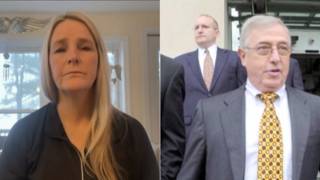
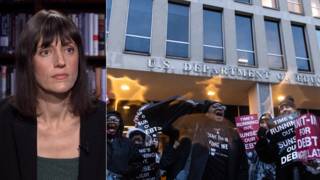
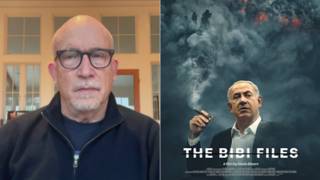
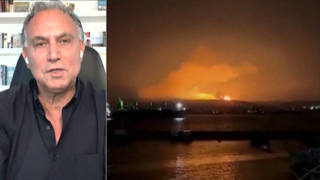





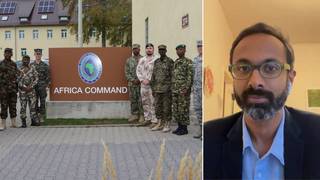
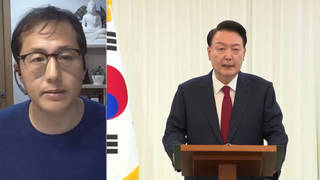
Media Options